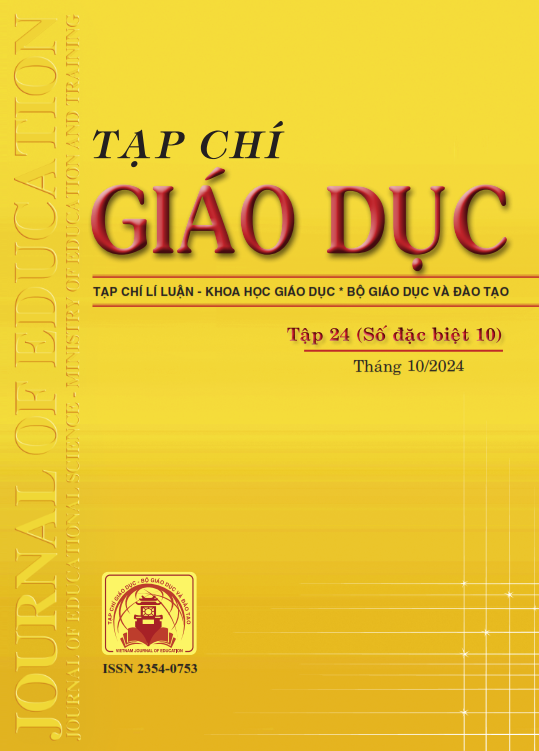Vận dụng một số kĩ thuật đánh giá quá trình trong dạy học giải bài tập toán lớp 7 nhằm đánh giá năng lực tư duy và lập luận toán học của học sinh
Tóm tắt
According to the 2018 General Education Program for Mathematics, mathematical thinking and reasoning competence is one of the mathematical competences that need to be formed and developed for students. Formative assessment takes place throughout the teaching and learning process, aiming to collect and provide feedback on students' learning, used by teachers to promote the teaching and learning process to achieve the set goals. This study has shown the manifestations and levels of mathematical thinking and reasoning ability of 7th grade students, thereby providing the basis for proposing process assessment techniques in teaching and solving math problems for 7th graders to assess their mathematical thinking and reasoning competence. The results of the article show that the opportunities for using formative assessment techniques in teaching Mathematics are very diverse and can take place right in the process of teaching specific content.
Tài liệu tham khảo
Ash, D. B., & Levitt, K. (2003). Working within the Zone of Proximal Development: Formative Assessment as Professional Development. Journal of Science Teacher Education, 14(1), 23-48.
Bahati, B., Tedre, M., Fors, U., & Evode, M. (2016). Exploring feedback practises in formative assessment in Rwandan higher education: a multifaceted approach is needed. International Journal of Teaching and Education, 4(2), 1-22. https://doi.org/10.20472/TE.2016.4.2.001
Black, P., & Wiliam, D. (1998). Assessment and classroom learning. Assessment in Education, Principles, Policy & Practice, 5(1), 7-74. https://doi.org/10.1080/0969595980050102
Black, P., & Wiliam, D. (2018). Classroom assessment and pedagogy. Assessment in education: principles, policy & practice, 25(6), 551-575. https://doi.org/10.1080/0969594X.2018.1441807
Bloom, B. S. (1969). Some theoretical issues relating to educational evaluation. In R. W. Tyler (Ed.), Educational evaluation: new toles, new means: the 63rd yearbook of the National Society for the Study of Education, part 2 (pp. 26-50). University of Chicago Press.
Boston, C. (2002). The concept of formative assessment. Practical Assessment, Research & Evaluation, 8(9), 1-4. https://doi.org/10.7275/kmcq-dj31
Bộ GD-ĐT (2018a). Chương trình giáo dục phổ thông môn Toán (ban hành kèm theo Thông tư số 32/2018/TT-BGDĐT ngày 26/12/2018 của Bộ trưởng Bộ GD-ĐT).
Bộ GD-ĐT (2018b). Chương trình giáo dục phổ thông - Chương trình tổng thể (ban hành kèm theo Thông tư số 32/2018/TT-BGDĐT ngày 26/12/2018 của Bộ trưởng Bộ GD-ĐT).
Ketabi, S., & Ketabi, S. (2014). Classroom and formative assessment in second/foreign language teaching and learning. Theory & Practice in Language Studies, 4(2), 435-440. https://doi.org/10.4304/tpls.4.2.435-440
Levy, T., & Gertler, H. (2015). Harnessing technology to assess oral communication in Business English. Teaching English with Technology, 15(4), 52-59. https://files.eric.ed.gov/fulltext/EJ1138436.pdf
Medina, E. G., & Hurtado, C. (2017). Kahoot! A digital tool for learning vocabulary in a language classroom. Revista Publicando.
Polya, G. (1957). How to Solve It. A New Aspect of Mathematical Method (Second edition), Princeton University Press, Princeton.
Popham, W. J. (2006). Phony formative assessments: buyer beware! Educational Leadership, 64(3), 86-87.
Rea-Dickins, P., & Gardner, S. (2000). Snares and silver bullets: disentangling the construct of formative assessment. Language Testing, 17(2), 215-243. https://doi.org/10.1177/026553220001700206
Scriven, M. (1967). The methodology of evaluation. In R. Tyler, R. Gagné & M. Scriven (Eds), Perspectives of curriculum evaluation (pp. 39-83). Rand McNally.
Stiggins, R. (2005). From formative assessment to assessment for learning: a path to success in standards-based schools. Phi Delta Kappan, 87(4), 324-328. https://doi.org/10.1177/003172170508700414
Đã Xuất bản
Cách trích dẫn
Số
Chuyên mục
Giấy phép

Tác phẩm này được cấp phép theo Ghi nhận tác giả của Creative Commons Giấy phép quốc tế 4.0 .












